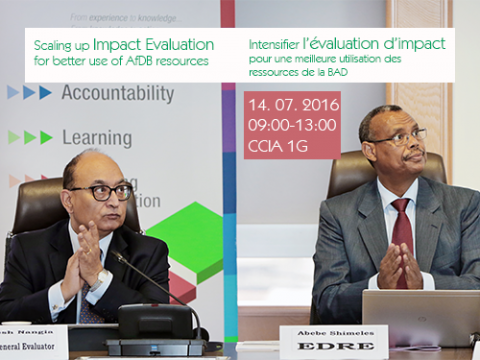
Independent Development Evaluation (IDEV), the Development Research Department (EDRE) and the Human Development Department (OSHD) of the AfDB co-organised an event on impact evaluation (IE) at AfDB Headquarters in Abidjan on 14th July 2016. The purpose was to raise awareness among the Bank’s Management and staff on the value of IE as an instrument for enhancing development effectiveness, how it can be used to inform and if necessary adjust the design of programmes, and to innovate in programme design.
"Impact Evaluation leads to better development".
Keynote speaker Manny Jimenez, Executive Director of the International Initiative for Impact Evaluation (3ie) opened with these words.
The focus of his speech was on how the Bank can benefit from Impact Evaluation, and what are the strategic options for scaling it up. He gave numerous examples of how Impact Evaluation had helped shape policy reform, including an example of how an Impact Evaluation of a youth wage subsidy experiment in South Africa helped inform the government's policy to roll out such subsidies on a larger scale.
Presenting IEs undertaken by the Development Research Department, Abebe Shimeles spoke of the way that technology is opening up a multitude of options for cost-effective Impact Evaluation, providing the example of how open-source satellite data could effectively be used for Impact Evaluation.
A presentation by Rafika Amira of IDEV stressed the value of implementing Impact Evaluation prospectively, ie. already including IE in the programme design phase, but also strategically and selectively, as IE is only one type of evaluation tool among others, and not appropriate for every type of intervention. Jochen Rudolph, AfDB’s Rural Water Supply and Sanitation Initiative (RWSSI) Focal Point, presented the findings of four IEs that the RWSSI Trust Fund had supported in a bid to set up a "real-time learning programme" for water and sanitation programmes. He pointed out that parallel government initiatives in the countries where the IEs were carried out had affected results.
The presentations were followed by a panel discussion, moderated by AfDB Executive Director Ronald Meyer with as panellists delegates from various Bank operations departments: Sunita Pitamber, Abebe Shimeles, Osward Chanda, Alex Rugamba and Bouchaib Boulanouar. All subscribed to the potential usefulness of IEs in accounting for results and informing future programme design, but also indicated a number of challenges to be overcome if the instrument is to be mainstreamed and scaled up across the Bank. These include a lack of baseline data, low quality of logframes, lack of the appropriate skills mix in project teams, time and budget pressures, inefficient processes, and dispersed knowledge.
See the events page for more details and documents related to the event.

